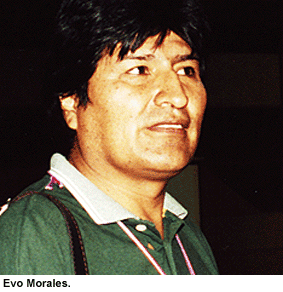BY ALEJANDRO RODRIGUEZ
In April 2000, Aguas de Tanari, a large multinational corporation, was due to take over the privatised water works in Cochabamba. Water prices were to increase and laws were passed to make it illegal to catch and use rain water. Water would be out of the reach of the majority of residents, 65% of whom live below the poverty line. Mass demonstrations erupted, roads were blocked and running battles where fought with the police and the army until the government gave in. The sell-off was defeated.
Evo Morales, of the Movement to Socialism (MAS), was one of the leaders of this battle. Morales has also led the peasants’ struggle against the US-sponsored forced eradication of coca and is a prominent leader of the indigenous Quechua people. Morales won a surprise second place in the June 30 presidential election.
Long before coca was used to make cocaine, the indigenous people of the Andean region, the Aymara and Quechua, chewed coca leaves as a dietary supplement. The consumption of coca leaves and tea is part of daily life for Bolivia’s peasants, miners and workers. The US-led “Plan Dignidad” (dignity plan), which seeks to reduce coca production to zero, is seen by them as an attack on the peasant’s livelihoods and the indigenous people’s way of life.
This US-financed plan involves US military advisers on the ground ordering Bolivian soldiers to attack, kill and displace peasants with US-made weapons. This has led to resistance among the peasants, with several self-defence groups being formed. In 2001, for the first time since coca eradication began, more police and soldiers were killed than peasants.
Morales has publicly declared that he not only supports the peasants’ right to self-defence but is participating in the organisation of these popular self-defence groups with the aim of forming a people’s army.
Since early 2001, Morales and the MAS have campaigned across Bolivia for the June 30 presidential election. The MAS platform included: the nationalisation of strategic industries; price reductions and a price freeze on household goods; the provision of basic services for all; defence of free public health and education; increased taxes for the rich; an end to corruption; the redistribution of land to those that work it; a new political apparatus; an end to neo-liberal economic policies; and opposition to a “flexible” work force.
In early August, Bolivia’s congress will choose either Morales or front-runner Gonzalo Sanchez de Lozada of the Nationalist Revolutionary Movement to be the country’s new president.
The MAS has only eight of the 27 members of the senate and 27 of the 130 members of the lower house. Morales has said that if the other parties want to vote for him, as many have already said they will, that is fine but he will not be making any deals. He prefers to be in opposition than be in coalition with corrupt parties.
When Green Left Weekly asked Morales earlier this year whether the members of the MAS in parliament will become as corrupt as so many other left candidates in Latin America, he replied that as they have been elected by their local communities as leaders, they will have very organised and angry communities to answer to if they betray.
Morales has declared that if the demands of the MAS supporters are not seriously addressed by the next president and parliament, then they will be won on the streets. However, the MAS wants to exhaust all peaceful methods before resorting to mass action.
?
This article was gathered from?Green Left Weekly, July 24, 2002, and?two photos were added by me.



